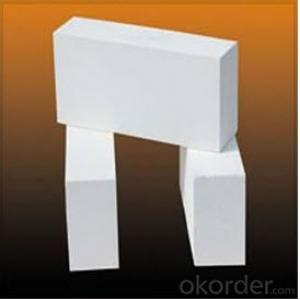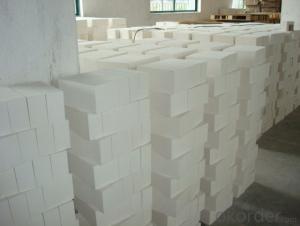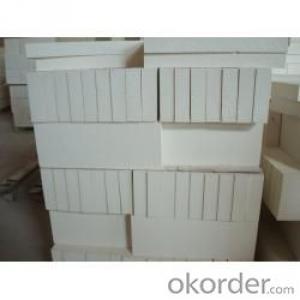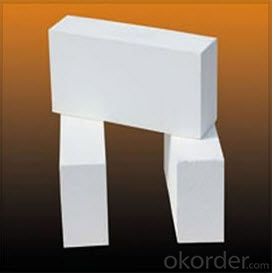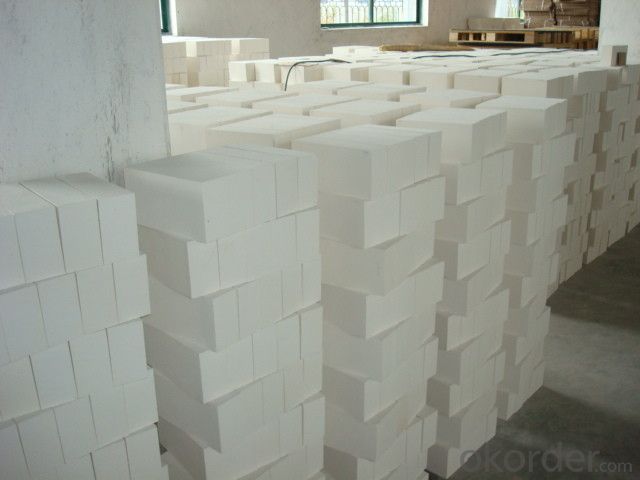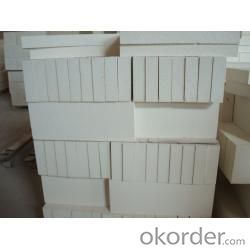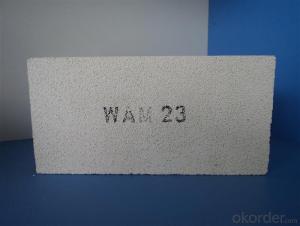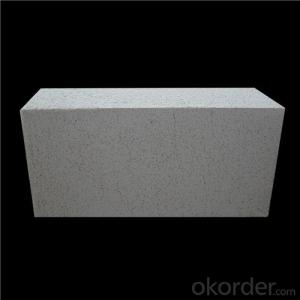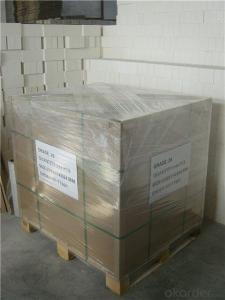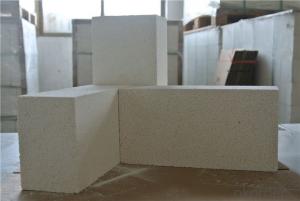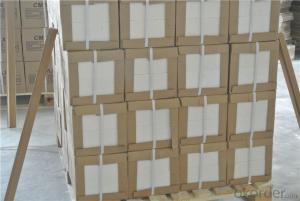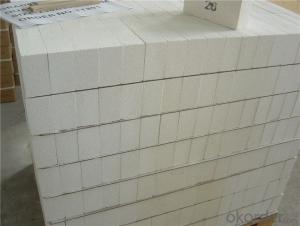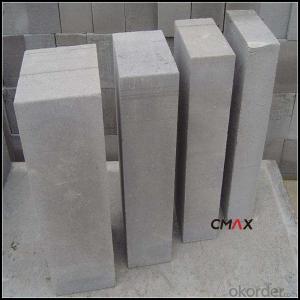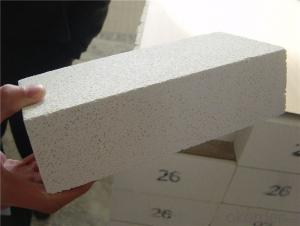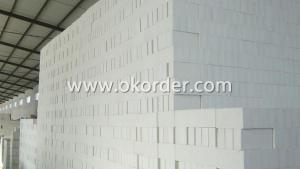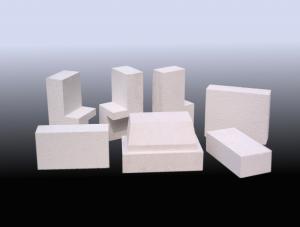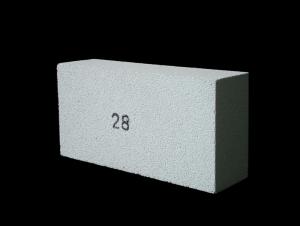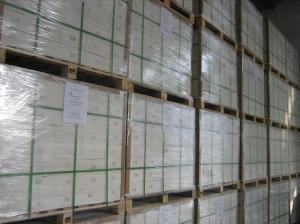Insulating Fire Brick - Refractory Fire Clay Brick for Thermal Insulation
- Loading Port:
- Tianjin
- Payment Terms:
- TT OR LC
- Min Order Qty:
- 30 m.t.
- Supply Capability:
- 1000 m.t./month
OKorder Service Pledge
OKorder Financial Service
You Might Also Like
CNBM conforms strictly to the requirements of ISO 9000 quality control system during the production. MSDS is also available if you want. The thermal insulation fire clay brick meet with the requirements of ASTM & JIS standards. So pls stay cool with our quality.
Insulating Fire Brick Technical index
Product No. | IFB70 | IFB60 | IFB50 | IFB40 |
Al2O3 | 68%-72% | 58%-62% | 48%-52% | 38%-40% |
Refractoriness (°C ) | ≥1790 | ≥1790 | ≥1790 | ≥1790 |
Bulk density (g/cm3) | 2.50-2.60 | 2.35-2.45 | 2.20-2.30 | 2.10-2.20 |
Apparent porosity (%) | 22 | 19-22 | 17-20 | 17-20 |
Cold Crushing strength (kg) | 480-510 | 450-480 | 430-450 | 390-430 |
Application
Insulating Fire Brick are used for the lining of converter, alternating current arc furnace, direct Current arc furnace and the ladle slag line, etc.
Equipment
1 unit of Ceramic Abrasive (SG Abrasive) pilot production line
2 units of Compact grain Abrasive pilot production lines
1 unit of high-end coated abrasives (abrasive cloth) production line
2 units of Boron Carbide production lines
3 large flexible crushing and sieving lines for grit production lines
2 units of 2000KVA furnaces for Boron Carbide fusion
6 units of 5000KVA-10000KVA dumping type electric arc furnaces for Brown Fused Alumina fusion
Company Advantage
(1)Long Insulating Fire Brick manufacture history: 25 years manufacturer
(2)Advanced equipment
(3)Diversification of production standards: ISO ANSI FEPA JIS ASTM
(4)Flexible payment: T/T L/C D/P D/A
(5)Professional marketing team and after-sale service
(6)Free sample
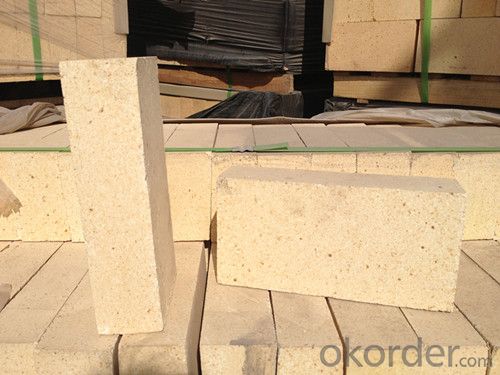
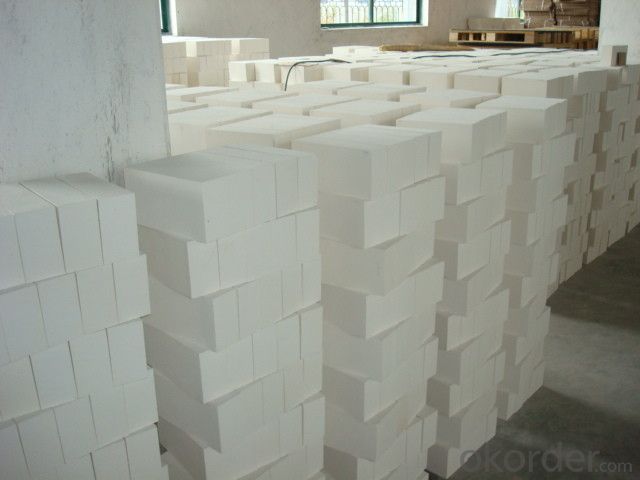
- Q: Can insulating fire bricks be used in chimneys or flues?
- Insulating fire bricks are not recommended for use directly in chimneys or flues. While these bricks are designed to withstand high temperatures, they are primarily used for insulation purposes rather than as a structural component. Chimneys and flues require bricks that are specifically engineered to withstand the intense heat and corrosive byproducts of combustion. These bricks, known as refractory bricks, are designed to have high thermal resistance and exceptional durability to ensure the safe and efficient operation of the chimney or flue. Therefore, it is advisable to use refractory bricks instead of insulating fire bricks when constructing or repairing chimneys and flues.
- Q: Can insulating fire bricks be used in the construction of ovens or kilns for pottery?
- Yes, insulating fire bricks can be used in the construction of ovens or kilns for pottery. Insulating fire bricks are specifically designed to withstand high temperatures and provide excellent insulation properties. They have a low thermal conductivity, which means they can effectively retain heat and prevent heat loss, making them ideal for creating and maintaining high temperatures required in pottery ovens or kilns. Additionally, insulating fire bricks have good resistance to thermal shock, meaning they can withstand rapid temperature changes without cracking or breaking. This makes them a reliable choice for constructing ovens or kilns that need to undergo frequent heating and cooling cycles. Overall, insulating fire bricks are a popular choice in pottery oven or kiln construction due to their thermal insulation properties and durability.
- Q: Do insulating fire bricks have a high fireproof rating?
- Indeed, insulating fire bricks possess a remarkable fireproof rating. These bricks have been specifically engineered to endure exceedingly high temperatures and offer exceptional insulation against the transfer of heat. They are crafted using specialized refractory materials with limited thermal conductivity, thereby aiding in the retention of heat and preventing its escape from the system. Insulating fire bricks are capable of withstanding temperatures ranging from 2300°F to 3100°F (1260°C to 1700°C), rendering them ideal for utilization in furnaces, kilns, fireplaces, and other applications involving elevated temperatures. Their elevated fireproof rating guarantees their ability to effectively safeguard structures and equipment from the intense heat and flames, enabling secure and efficient operations across diverse industries.
- Q: Can insulating fire bricks be used in electric furnaces?
- Yes, insulating fire bricks can be used in electric furnaces. These bricks are specifically designed to withstand high temperatures and provide excellent insulation, making them suitable for use in electric furnaces where heat retention is crucial.
- Q: How do insulating fire bricks compare to other insulation materials?
- Insulating fire bricks are highly effective insulation materials that offer several advantages over other insulation materials. First and foremost, insulating fire bricks have excellent thermal properties, meaning they can efficiently prevent the transfer of heat. They have a low thermal conductivity, which allows them to effectively insulate against high temperatures. This makes them ideal for use in applications where heat retention is crucial, such as furnaces, kilns, and fireplaces. Compared to other insulation materials like fiberglass or mineral wool, insulating fire bricks are much more durable and long-lasting. They can withstand extremely high temperatures without losing their insulating properties or structural integrity. This durability makes them a cost-effective choice since they require less frequent replacement. Another advantage of insulating fire bricks is their ability to resist chemical attack and wear. They are resistant to acids, alkalis, and other corrosive substances, making them suitable for applications involving harsh chemicals or environments. Furthermore, insulating fire bricks have a high compressive strength, allowing them to bear heavy loads without cracking or breaking. This makes them suitable for use in structural applications where weight-bearing capacity is essential. In terms of installation, insulating fire bricks are easy to work with. They can be cut, shaped, and installed using basic tools, allowing for customization and flexibility in different applications. They are also lightweight, which simplifies the installation process and reduces the overall weight of the structure. Overall, insulating fire bricks offer superior insulation properties, durability, resistance to chemicals, and ease of installation compared to other insulation materials. Their ability to withstand high temperatures, resist wear and tear, and provide long-lasting insulation make them an excellent choice in various industrial and domestic settings.
- Q: How do insulating fire bricks affect heating or cooling times?
- Insulating fire bricks help to reduce heating or cooling times by providing excellent thermal insulation. They have low thermal conductivity, which means they minimize heat transfer between the hot or cold surface and the surrounding environment. As a result, insulating fire bricks can effectively retain heat or coldness, allowing for faster heating or cooling of the desired area.
- Q: Can insulating fire bricks be used in the construction of autoclaves?
- Yes, insulating fire bricks can be used in the construction of autoclaves. Autoclaves require materials that can withstand high temperatures and pressures, and insulating fire bricks are designed to have excellent thermal resistance and insulation properties. These bricks are made from refractory materials like alumina, silica, and other additives that allow them to withstand extreme temperatures and thermal shocks. They are also lightweight and have low thermal conductivity, which helps to minimize heat loss and improve energy efficiency in autoclaves. Additionally, insulating fire bricks have good load-bearing capacity, making them suitable for the structural components of autoclaves. Overall, the use of insulating fire bricks in the construction of autoclaves helps to ensure the safety and efficiency of the equipment.
- Q: Can insulating fire bricks be used in ceramic kilns?
- Certainly, ceramic kilns can make use of insulating fire bricks. These bricks are specifically crafted to possess a minimal thermal conductivity, enabling them to better retain heat. Consequently, they prove to be an excellent option for lining the kiln walls, facilitating the conservation and uniform distribution of heat within the kiln chamber. Furthermore, these fire bricks are lightweight and possess exceptional resilience against thermal shock, rendering them highly durable and capable of withstanding the elevated temperatures commonly achieved in ceramic kilns.
- Q: Are insulating fire bricks resistant to water absorption?
- Yes, insulating fire bricks are highly resistant to water absorption.
- Q: What is the lifespan of insulating fire bricks?
- The lifespan of insulating fire bricks can vary depending on several factors. Typically, these bricks are designed to have a long lifespan and can last for several years or even decades if properly installed and maintained. The quality of the insulating fire bricks plays a significant role in determining their lifespan. High-quality bricks that are manufactured using superior materials and manufacturing processes tend to have a longer lifespan compared to lower-quality bricks. It is essential to choose bricks from reputable manufacturers that adhere to strict quality control standards. Another critical factor is the application and conditions in which the insulating fire bricks are used. If the bricks are exposed to extreme temperatures, such as in furnaces or kilns, they may experience thermal shock and degradation over time. Similarly, exposure to corrosive chemicals or abrasive materials can also impact the lifespan of the bricks. Proper installation and maintenance are crucial for maximizing the lifespan of insulating fire bricks. They should be installed according to the manufacturer's guidelines, ensuring that they are properly aligned and supported. Regular inspections should be conducted to identify any signs of damage or wear, and immediate repairs or replacements should be made as needed. Overall, while the specific lifespan of insulating fire bricks cannot be determined with absolute certainty, it is reasonable to expect them to last for several years to several decades when used in appropriate applications and maintained properly.
Send your message to us
Insulating Fire Brick - Refractory Fire Clay Brick for Thermal Insulation
- Loading Port:
- Tianjin
- Payment Terms:
- TT OR LC
- Min Order Qty:
- 30 m.t.
- Supply Capability:
- 1000 m.t./month
OKorder Service Pledge
OKorder Financial Service
Similar products
Hot products
Hot Searches
Related keywords
